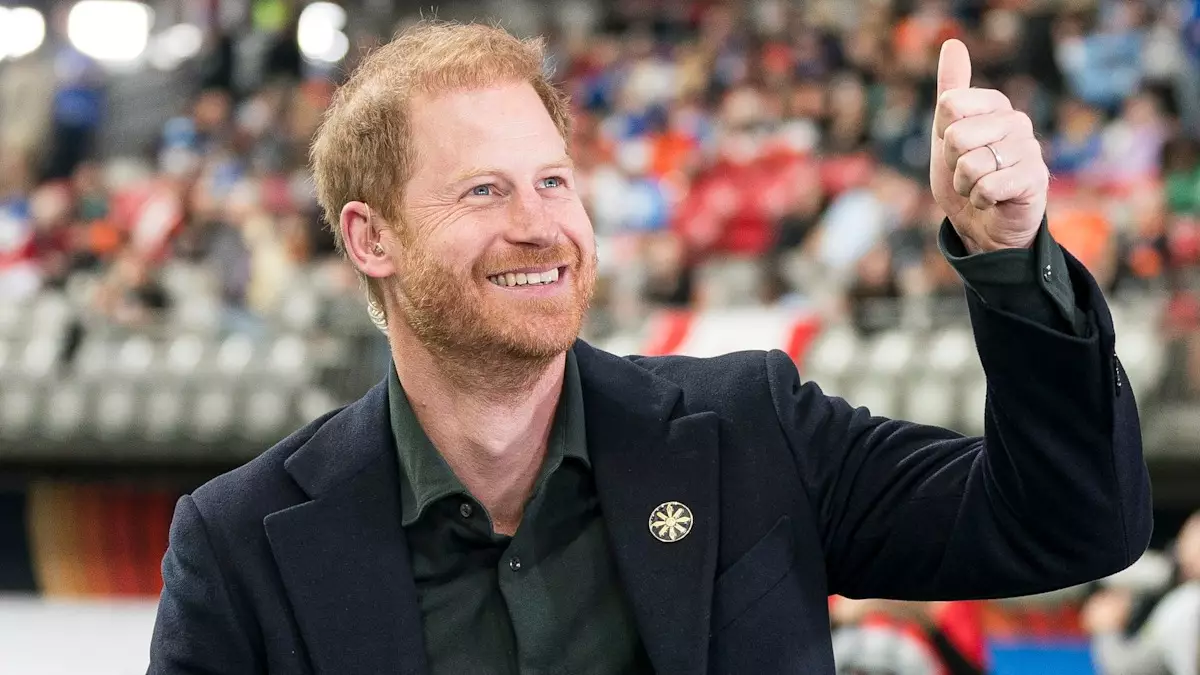Since Prince Harry’s departure from the royal fold over four years ago, his transition to life in Montecito, California, represents more than just a geographical shift; it symbolizes a significant cultural transformation. Embracing his new life with Meghan Markle and their two children, Harry has begun to reflect the influence of his American surroundings, particularly noticeable through his evolving accent and speaking style. Observers have keenly noted how the Duke of Sussex’s once-pristine British accent seems to be melding with American vernacular, marking a transformation that raises questions about identity, culture, and adaptation in a foreign land.
In a relatively short span since he relocated, Harry’s accent has taken on a decidedly more informal and relaxed quality, which has sparked discussion among fans and linguistic experts alike. A recent light-hearted video showcasing Harry at East Side Ink tattoo parlor in New York City accentuates this transition. Casual exchanges between Harry and musician Jelly Roll reveal phrases such as “Screw it, let’s do it,” a quintessential American expression, and the term “dude,” showcasing a slippage of his formerly rigid Etonian English into the lexicon of contemporary American youth culture.
This divergence in speech patterns not only highlights the shift in his accent but also signifies a broader adaptation to his new lifestyle. Linguistic expert Anthony Shuster pointed out that Harry’s articulation has become decidedly less pronounced. Indeed, the degree of this transformation has prompted discussions regarding not just personal identity but the impact of one’s social circle and environment on linguistic expression. This resonant change raises intriguing possibilities about how physical and cultural distances can reshape individuals’ ways of speaking.
The relationship between Prince Harry and Meghan Markle, a native Californian, serves as a significant influence on this linguistic evolution. Communication specialists attribute the adoption of new speech patterns to prolonged exposure to different accents and mannerisms. As someone who interacts closely with Meghan daily, Harry naturally absorbs aspects of her Californian dialect, further facilitating this linguistic transition. This phenomenon underscores a potent truth about language: it is highly adaptive and sensitive to the surrounding cultural narratives one is immersed in.
Experts like Tony Thorne have elaborated on the idea that close interactions with someone who embodies a distinct accent can lead to shifts in speech. When Harry introduced his son, Archie, to the world, his manner of speaking already hinted at a softer articulation that mirrors American speech patterns. It should be noted that these subtle linguistic modifications reveal much about the bond and integration one experiences when sharing daily life with someone from a different cultural background.
The influence of living in the United States is further corroborated by Harry’s recent statements articulating his love for his new environment. During a segment with Good Morning America, he mentioned his appreciation for California living and depicted a sense of thriving as a family. “Our kids are bilingual, so they are going to flourish here,” he remarked, establishing that his family’s future in America is being nurtured in an environment enriched by both British and American narratives.
For many fans, these changes in Harry’s accent are perceived as a natural evolution rather than an act of diluting his British heritage. Comments across social media reflect a sense of acceptance towards his new American-tinged speech, with enthusiastic responses highlighting this adaptation as an embrace of American culture. However, some critics remain nostalgic for the royal family’s traditional eloquence, viewing Harry’s adaptation as a symbolic departure from his roots.
Notably, Harry’s accent transformation isn’t the first instance of linguistic adaptation drawing public attention. His podcast episodes have previously featured distinctly American phrases such as “awesome” and “you guys,” capturing how subtly, yet powerfully, language can evolve when encountering new cultural norms. This duality raises essential questions about identity and the motivations behind adopting another culture’s linguistic characteristics. Is it merely an effort to connect with a broader audience, or does it reflect a deeper personal assimilation into a new way of life?
As the Duke of Sussex continues navigating his life beyond the royal palace, watching how his evolution as an individual and his relationship with language unfolds revitalizes the conversation about identity and adaptation. Ultimately, Prince Harry’s experience serves as a microcosm for the ways in which environments and relationships can shape communication and how personal identity is understanding through the lens of cultural shifts. His journey invites others to reflect on their transformations in language and culture as they traverse between worlds.

Leave a Reply